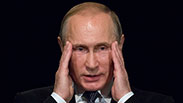
Surprise, surprisky
Op-ed: With Russia deploying its planes in Iran, Israel must ask itself how greater Russian influence in the Middle East could affect its own security.
Allowing the deployment of Russian bomber planes in the Iranian airport of Hamadan and having those forces make daily trips into Syria constitute a monumental event in Iranian history. Never before has Iran let foreign forces into its territory. This move displays the full the ineptitude of the Ayatollah regime's attempt to subdue Syrian President Bashar al-Assad's dissidents without Russian assistance, in addition to showcasing Russia's failure to determine the Syrian War's outcome. All this while we sit on the border of the and rub up against it.
Understanding Russia's recent moves necessitates a return to the Molotov–Ribbentrop Pact from August 1939 between the Soviet Union and Nazi Germany, from a week before the breaking of WWII. The pact was comprised of two parts: a public non-aggression agreement between the two countries, and a secret arrangement made to divide Central Europe into USSR and German-influenced zones.
Following the pact, the Soviet Army and the German Wehrmacht invaded Poland, defeating it with ease and throwing a joint parade in celebration. Ten months later, Estonia, Latvia and Lithuania were all stripped of their independence, and a Soviet law declared that they had never existed. Germany, for its part, managed to conquer Western Europe thanks to fuel provided to it by the USSR. The situation drove Churchill to declare that Britain could very well fall under German rule; if Hitler had not made the mistake of turning against Russia, he might not have been defeated.
For decades after the war was over, the Molotov–Ribbentrop Pact was not to be mentioned in Soviet Russia, with its congress publicly condemning the agreement only in 1992. It is particularly important, though, to track the current Russian President Vladimir Putin's shifting position on the pact: In 2008, he had condemned it during a conversation with the three Baltic countries' presidents. Back then, Putin had stressed that the agreement did not reflect Russian sentiment and should be viewed as no more than "a private agreement between Hitler and Stalin."
Two years ago, however, Putin expressed a change of heart, when he justified Russia's conquering of Poland as punishment for Poland's actions, explaining during a meeting with German Chancellor Angela Merkel that the agreement had intended to secure Russia's safety from Germany, after Russia had unsuccessfully tried to present a firm front against Germany throughout the 1930s.
The principles of the Molotov–Ribbentrop Pact are still alive and well, as is Russia's modus operandi. Its latest moves in the Middle East reflect a desire to secure Russia's influence over geographical locations and regimes. In practice, Russia would like to return to the way things were in 1973, when it wielded its influence over Iraq, Syria, Libya and different liberation movements, including Palestinian ones. It would like to become a major weapons supplier in the area and a force to be reckoned with and considered in any Middle East dispute.
Putin possesses a rare level of skill in using his cunning, strategic misdirection, misinformation and simultaneously using what it publicly known and what is kept secret, all while relying on the intel at his disposal. So far, his successes have been greater than his failures. It isn't hard to understand why his own security is linked to the goings on in our area. It is less clear how Israel's security is affected by positioning Russian Tupolev planes in Iran's Hamadan Airport. It would behoove us not to be surprised in the matter.










